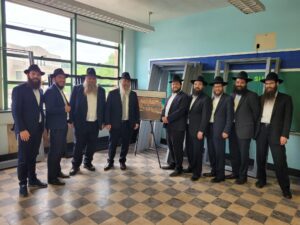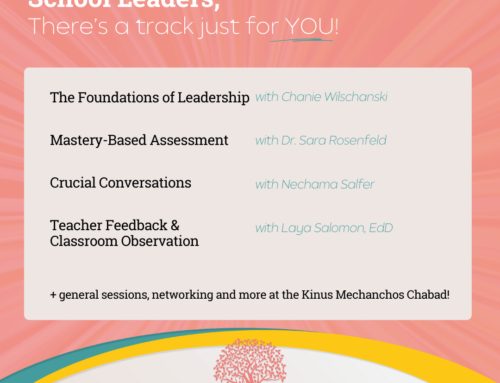 Op-Ed by Mrs. Chanah Rose: If Chinuch is the most important role, then why is it the most difficult? Here are just a few reasons why.
Op-Ed by Mrs. Chanah Rose: If Chinuch is the most important role, then why is it the most difficult? Here are just a few reasons why.
Teaching: the hardest job in the world, and the most important.
The most important because, as Yidden, our Mesorah literally depends on successful transmission to the next generation. Everything we hope our children will absorb, all the values we hold dear, depend on the Chinuch that we provide.
Chinuch is everything. In a farbrengen Rabbi Zalmen Leib Markowitz recently gave to Mechanchos, he marveled that almost every Sicha or letter of the Rebbe is about Chinuch. Mrs. Rivka Slonim has been heard to quip that just like there are only three rules of real estate, “location, location, location,” she feels that there are only three things in life: “education, education, education.” Of course, education is for adults as well, but it is our children’s teachers during their formative years who launch them onto a lifelong journey of learning.
It is true that Chinuch comes from a multitude of influences, starting from the home. However, on many occasions the Rebbe stressed the vital and all-encompassing role of educators, now more than ever:
“It used to be that the task of a school was primarily to give students Torah knowledge, but in our time, and especially and in our land, the school’s role is not only to enrich the students’ knowledge base in Torah and Yiddishkeit, but primarily to implant within them Yiras Shamayim, careful observance of Mitzvos, and, in general, the Jewish way of life.” (אג״ק, כרך יב, אגרת ד׳קצז)
So if Chinuch is the most important role, then why is it the most difficult? Here are just a few reasons why:
 1) Teaching has no boundaries.
1) Teaching has no boundaries.
Have you ever struggled with work-life balance? Having a hard time turning off thoughts about the office when you get home? What if your work involves one or two dozen individual children, entire worlds, each with their own challenges and struggles? Teachers care deeply about each of their students, making it difficult to simply turn off thoughts about those students and relax after hours.
That is not to mention the piles of homework that teachers bring home with them. There are papers to mark, lessons to prepare, phone calls to parents, and much more. Summer vacations may seem enticing, but many teachers spend them on professional development seminars and upgrading their classrooms and lessons to be prepared for the coming year.
The Rebbe underscored the all-pervasive nature of teaching, almost like the 24/7 nature of parenting. In a Sicha about Chinuch (שיחת ליל ב’ דחג הפסח, תשי”ג), the Rebbe said, “It is not enough to teach them for the number of hours he is required to do so, and afterwards to go rest… Rather, [the teacher] must continue to toil and and remain invested in his students with all of his being.” It is hard to imagine the level of Mesiras Nefesh that teachers often have. As a community, it is up to us to recognize this and show our hakaras hatov.
 2) The successes are hidden from view.
2) The successes are hidden from view.
Teaching takes place behind closed doors. Rarely do parents catch a glimpse of what teachers are doing. Rarely are those beautiful teachable moments and breakthroughs captured to share with others. Even in the days of WhatsApp photos and videos, the moments where authentic learning happens, the true successes of teaching, are not often seen and are not something you can capture on camera.
Furthermore, the greatest successes of teaching – greater than a Perek finished or ten new vocabulary words – are unquantifiable. When a teacher patiently nurtures his or her students for a year, before passing them on to the next grade’s teacher, which quantum leaps have they achieved that can be measured? Like a farmer who tends to his seeds without seeing results for days, years, or even decades, who can point to the internal, spiritual and emotional growth that quietly takes place beneath the surface?
For every tragic story about education gone wrong, there are one hundred untold stories about education gone right. At the Menachem Education Foundation’s Kinus Mechanchos this summer, a kovetz of thank you letters and success stories was distributed called Thank You Morah. Read it – with a box of tissues nearby.
 3) Teachers need tools.
3) Teachers need tools.
There is a lot of confusion about whether Chinuch is an art or a science, a calling or a profession. The Rebbe gives us tremendous clarity about this by maintaining that first and foremost, Chinuch is a Shlichus, to be undertaken by people with a chush for it and with Yiras Shamayim. But the Rebbe did not stop there.
The Rebbe called in very strong terms for Hishtalmus Hamorim – which translates as professional development for teachers. Even a born teacher needs skills for the classroom. Coaching and mentorship can help develop a teacher’s potential, and offset the all too common fallout of inspired teachers who leave the field in their first few years.
There is a clear letter from the Rebbe to a member of the Israeli board of education (אגרות קודש, חלק י”ח, אגרת ו’ תקו) that if the passion and the commitment is there the skill can be learned very quickly. So why must we leave our precious teachers to sink or swim?
As a community, we can help to professionalize this field without compromising on its sacred and holy foundation as a Shlichus. By providing teachers with growth opportunities, we achieve a number of things: We make their job easier, so they want to stay. We facilitate greater success in the classroom, and more positive impact on our children. We create motivation, because every person is a mehalech, and will feel better about a field in which they can learn and grow. And we build the future leaders of Chinuch, people who can then train and coach other teachers, and serve in school leadership positions.
 4) Teachers need to make a living.
4) Teachers need to make a living.
Pay is also an important part of professionalizing Chinuch. While absolutely no teachers ever go into the field because of money, many, all too many, are forced to leave because of it. Often it is because of a simple struggle to make ends meet. Other times it is because it is de-motivating to be on the bottom rung of the payscale, for a job that requires more skills and sensitivity than a C-level executive. We are human. We need to uplift our teachers in any possible way that we can.
In addition to finding ways to increase our teachers salaries, schools can also take other steps to help teachers feel better about their roles, whether or not the funds are available. Showing hakaras hatov with a personal note or gift along with the paycheck, ensuring timely pay to show that teachers aren’t taken for granted, building in a transparent payscale based on years of experience and expertise, will all help teachers feel better about the work that they do. These are all things that many schools are working to put into place, and parents can find out how to support them in doing so.
These are just some of the reasons why the most important, and most rewarding, job in the world, is also the most difficult. Many of the solutions suggested to these challenges may be easier said than done. But if we truly believe that Chinuch is our future, then we need to do everything in our power to motivate, train, support, thank, recognize, and uplift our Mechanchim and Mechanchos on the front lines.
Statistics, stories and countless conversations show that gaps in teaching staff are one of the biggest challenges facing schools today, both within the Chabad community and well beyond. It’s time for us, as a community, to start talking about teachers.
 Let’s allow our children to hear us praising their teachers (and address challenges in a private, respectful way). Let’s encourage our seminary girls and Yeshiva students to take up this vital Shlichus and show our joy and pride when they do. Let’s support opportunities for teachers to grow in their profession, to be successful, and to feel good about their work.
Let’s allow our children to hear us praising their teachers (and address challenges in a private, respectful way). Let’s encourage our seminary girls and Yeshiva students to take up this vital Shlichus and show our joy and pride when they do. Let’s support opportunities for teachers to grow in their profession, to be successful, and to feel good about their work.
Because you, the Mechanchim and Mechanchos, are our heroes.




